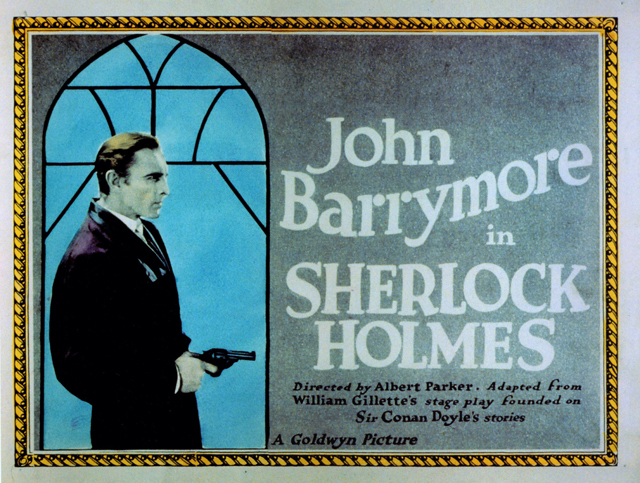Sherlock Holmes In Classic Form At Silent Summer Film Festival
By Steven Pate in Arts & Entertainment on Jul 20, 2012 7:00PM
 Forget the epic battle against an arch-villain. Leave aside the action stunts. In fact, you can even keep the solving of the big mystery. The best part of any Sherlock Holmes adaptation is the inevitable sequence when Holmes rattles off a series of uncannily precise, seemingly unknowable observations about someone and then responds to that person's inevitable disbelief with an exhaustive accounting of the almost imperceptible forensic minutiae he has registered almost instantaneously and from which he has deduced, invariably, the most probable cause. Even Guy Ritchie's 2009 incarnation, which got so very many things wrong, got this right:
Forget the epic battle against an arch-villain. Leave aside the action stunts. In fact, you can even keep the solving of the big mystery. The best part of any Sherlock Holmes adaptation is the inevitable sequence when Holmes rattles off a series of uncannily precise, seemingly unknowable observations about someone and then responds to that person's inevitable disbelief with an exhaustive accounting of the almost imperceptible forensic minutiae he has registered almost instantaneously and from which he has deduced, invariably, the most probable cause. Even Guy Ritchie's 2009 incarnation, which got so very many things wrong, got this right:
It's no accident the Reader's J.R. Jones calls this the single best scene in the movie: it is simply the most Holmesian. Robert Downey Jr. has the intelligence for the part, but the film itself exasperates purists as much as it delights. Downey Jr. turns Sherlock into is a charismatic, wise-cracking action hero—a steampunk Tony Stark without the bankroll. That Sherlock exercises his powers of deduction and his abs in equal measure is not the kiss of death: it's that Ritchie has reduced Sherlock's terminal weakness (an atrophied ability to relate to other people) to little more than a cad's insouciance.
The other current high profile incarnation, BBC's Sherlock series starring Benedict Cumberbatch, does a better job of nestling his strength (reasoning) within his weakness (coldness). The Independent's Tom Sutcliffe put it perfectly when he noted that, these days, "You'd diagnose Benedict Cumberbatch's Holmes as high-functioning Asperger's." This money shot of intimidating deduction succeeds in making him not merely a jerk, but a robot-like savant who cannot see why he unnerves you so:
The bravura forensic turn doesn't come until about half an hour into the 1922 adaptation starring John Barrymore, opening tonight as the first film of the Silent Summer Film Fest at the Portage Theater, but when it does it is a welcome sight. It means that the fascinating but odd first third of the movie, a sort of Sherlock Holmes Origin Story recounting his time as a student in Cambridge, has come to an end and the fully-formed detective is ready to get to work. Not that the "Sherlock Begins" storyline has its charms, such as a philosophical young Sherlock contemplating love:
The real treat of director Albert Parker's adaptation of William Gillette's theatrical version of Sherlock (blessed by creator Arthur Conan Doyle and staged hundreds of times before this film) is John Barrymore's face. Using his expressive brow and the occasional timely middle distance stare off-screen, Barrymore conveys the activity of the mind with inventiveness and theatricality. Sherlock Holmes stories, so reliant on verbal descriptions, are inevitably impoverished when limited to intertitles and on-screen action, but rooting for Barrymore and company try and pull it off is great fun. Gustav von Seyfferitz' ghoulish Moriarty and an irresistibly wet-behind-the-ears William Powell are icing on the cake.
There is something both timeless and anachronistic about Sherlock Holmes. He is a hero whose signature trait is adaptable and innate, not reliant on a back story involving radioactivity or space travel. Yet no matter how many times he is reinvented and stripped of his deerstalker, pipe and other Victorian era accoutrements, there is something antiquated about the character. The spectacle of a human who saves the day by piecing together disparate bits of data, so natural to the world of Scotland Yard, is becoming a little weird: that's something we let algorithms do for us now. Still, 122 years after he was created, Sherlock shows no sign of stopping.
Sherlock screens tonight at 8 p.m. as part of the Silent Summer Film Festival, with live organ accompaniment from Jay Warren provides live organ accompaniment, and an opening set by the Great Lakes Trio, at The Portage Theater, 4050 N. Milwaukee Ave.